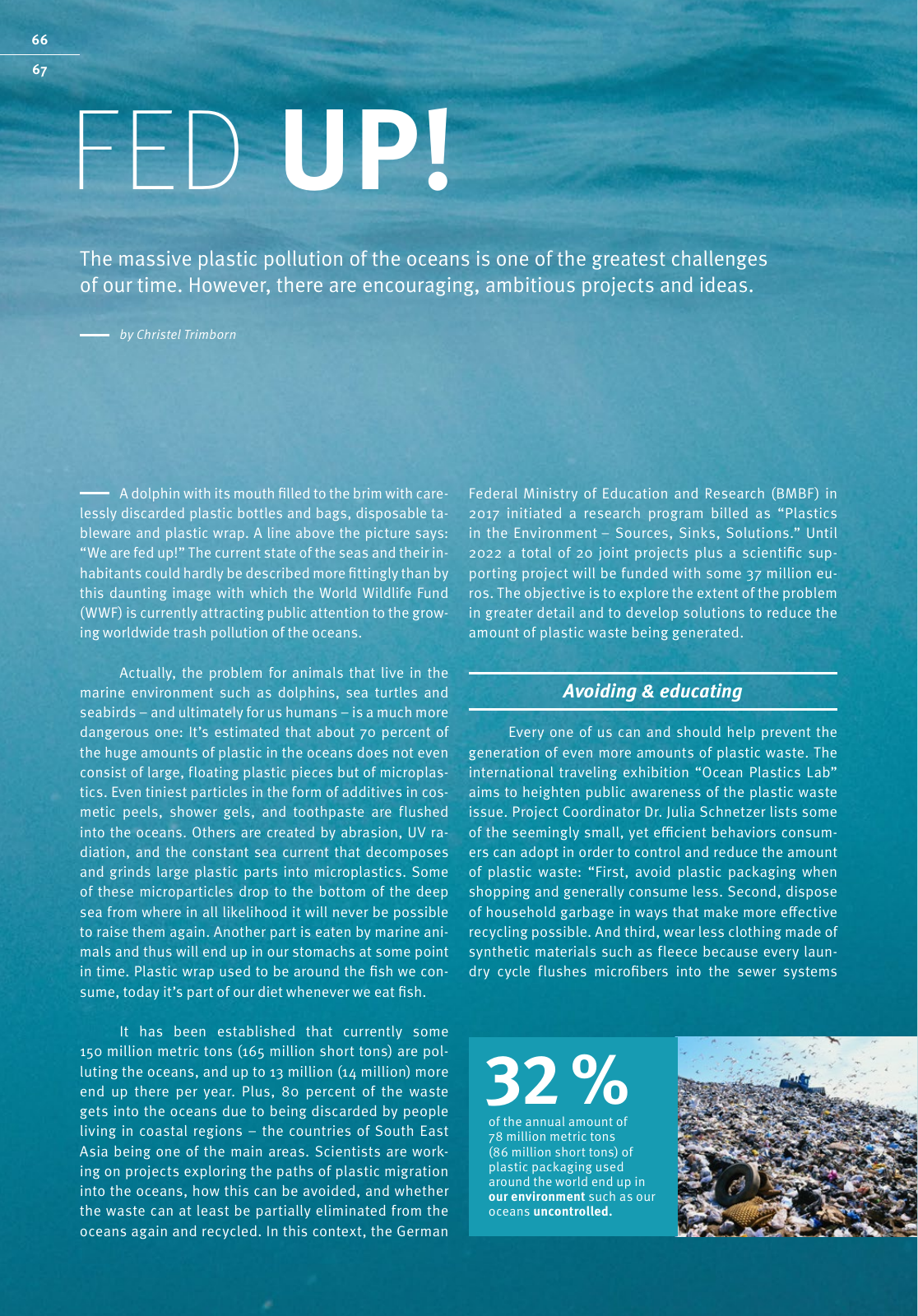The massive plastic pollution of the oceans is one of the greatest challenges of our time However there are encouraging ambitious projects and ideas by Christel Trimborn FED UP A dolphin with its mouth filled to the brim with care lessly discarded plastic bottles and bags disposable ta bleware and plastic wrap A line above the picture says We are fed up The current state of the seas and their in habitants could hardly be described more fittingly than by this daunting image with which the World Wildlife Fund WWF is currently attracting public attention to the grow ing worldwide trash pollution of the oceans Actually the problem for animals that live in the marine environment such as dolphins sea turtles and seabirds and ultimately for us humans is a much more dangerous one It s estimated that about 70 percent of the huge amounts of plastic in the oceans does not even consist of large floating plastic pieces but of microplas tics Even tiniest particles in the form of additives in cos metic peels shower gels and toothpaste are flushed into the oceans Others are created by abrasion UV ra diation and the constant sea current that decomposes and grinds large plastic parts into microplastics Some of these microparticles drop to the bottom of the deep sea from where in all likelihood it will never be possible to raise them again Another part is eaten by marine ani mals and thus will end up in our stomachs at some point in time Plastic wrap used to be around the fish we con sume today it s part of our diet whenever we eat fish It has been established that currently some 150 million metric tons 165 million short tons are pol luting the oceans and up to 13 million 14 million more end up there per year Plus 80 percent of the waste gets into the oceans due to being discarded by people living in coastal regions the countries of South East Asia being one of the main areas Scientists are work ing on projects exploring the paths of plastic migration into the oceans how this can be avoided and whether the waste can at least be partially eliminated from the oceans again and recycled In this context the German Federal Ministry of Education and Research BMBF in 2017 initiated a research program billed as Plastics in the Environment Sources Sinks Solutions Until 2022 a total of 20 joint projects plus a scientific sup porting project will be funded with some 37 million eu ros The objective is to explore the extent of the problem in greater detail and to develop solutions to reduce the amount of plastic waste being generated Avoiding educating Every one of us can and should help prevent the generation of even more amounts of plastic waste The international traveling exhibition Ocean Plastics Lab aims to heighten public awareness of the plastic waste issue Project Coordinator Dr Julia Schnetzer lists some of the seemingly small yet efficient behaviors consum ers can adopt in order to control and reduce the amount of plastic waste First avoid plastic packaging when shopping and generally consume less Second dispose of household garbage in ways that make more effective recycling possible And third wear less clothing made of synthetic materials such as fleece because every laun dry cycle flushes microfibers into the sewer systems 32 of the annual amount of 78 million metric tons 86 million short tons of plastic packaging used around the world end up in our environment such as our oceans uncontrolled 66 67

Hinweis: Dies ist eine maschinenlesbare No-Flash Ansicht.
Klicken Sie hier um zur Online-Version zu gelangen.
Klicken Sie hier um zur Online-Version zu gelangen.